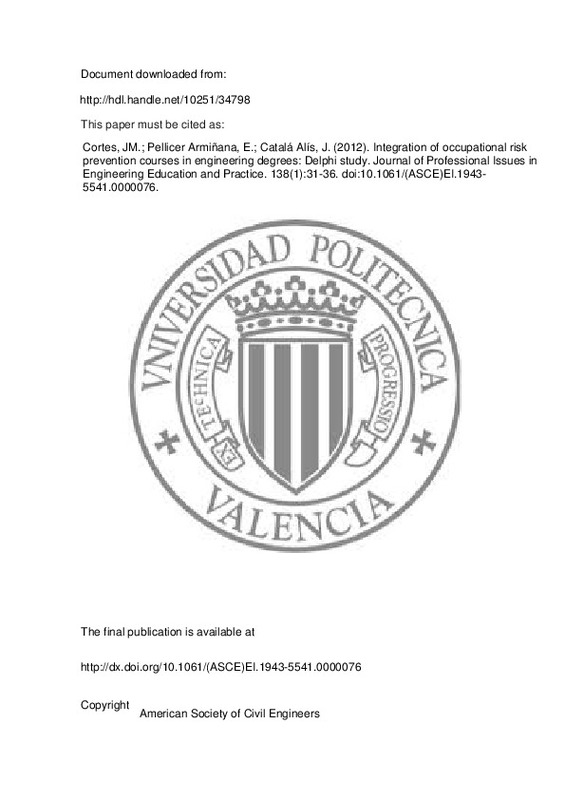Cortés Díaz, JM.; Pellicer Armiñana, E.; Catalá Alís, J. (2012). Integration of occupational risk prevention courses in engineering degrees: Delphi study. Journal of Professional Issues in Engineering Education and Practice. 138(1):31-36. doi:10.1061/(ASCE)EI.1943-5541.0000076
Por favor, use este identificador para citar o enlazar este ítem: http://hdl.handle.net/10251/34798
|
Título:
|
Integration of occupational risk prevention courses in engineering degrees: Delphi study
|
|
Autor:
|
Cortés Díaz, José María

 Pellicer Armiñana, Eugenio
Catalá Alís, Joaquín
Pellicer Armiñana, Eugenio
Catalá Alís, Joaquín
|
|
Entidad UPV:
|
Universitat Politècnica de València. Departamento de Ingeniería de la Construcción y de Proyectos de Ingeniería Civil - Departament d'Enginyeria de la Construcció i de Projectes d'Enginyeria Civil
|
|
Fecha difusión:
|
|
|
Resumen:
|
Engineering syllabi often lack courses covering occupational risk prevention. In Spain, professional competences are awarded along with the completion of a university degree. This means that new graduates are certified in ...[+]
Engineering syllabi often lack courses covering occupational risk prevention. In Spain, professional competences are awarded along with the completion of a university degree. This means that new graduates are certified in areas in which they have received little or no training, such as occupational risk prevention. However, the academic reforms established by the Bologna Process, which strives to homogenize university degrees throughout Europe, compels European universities to design new syllabi. The main goal of this paper is to define a framework for including occupational risk-prevention education in the new engineering syllabi. This exploratory research applied the Delphi methodology to a panel of 59 experts, using questionnaires assessed with a four-point Likert scale through two rounds. A website supported the information flow. According to the experts who participated in this study, education and training in occupational risk-prevention is essential for improving the safety culture within a company or workplace. The experts concurred that this subject should be a separate mandatory course in all engineering degree programs. The participants recommended that an optional course should be considered only if a mandatory course is not approved. It was also deemed desirable to integrate occupational risk prevention as a cross-field subject in other technological courses, even if the curriculum already includes some related courses. © 2012 American Society of Civil Engineers.
[-]
|
|
Palabras clave:
|
Delphi
,
Education
,
Engineering
,
Occupational
,
Prevention
,
Risk
,
Bologna process
,
Delphi methodology
,
DELPHI study
,
Education and training
,
Engineering degrees
,
European universities
,
Exploratory research
,
Four-point
,
Information flows
,
Professional competence
,
Safety culture
,
University degree
,
Curricula
,
Engineering education
,
Occupational therapy
,
Risks
,
Surveys
,
Technical presentations
,
Occupational risks
|
|
Derechos de uso:
|
Reserva de todos los derechos
|
|
Fuente:
|
Journal of Professional Issues in Engineering Education and Practice. (issn:
1052-3928
) (eissn:
1943-5541
)
|
|
DOI:
|
10.1061/(ASCE)EI.1943-5541.0000076
|
|
Editorial:
|
American Society of Civil Engineers
|
|
Versión del editor:
|
http://dx.doi.org/10.1061/(ASCE)EI.1943-5541.0000076
|
|
Tipo:
|
Artículo
|







![[Cerrado]](/themes/UPV/images/candado.png)


